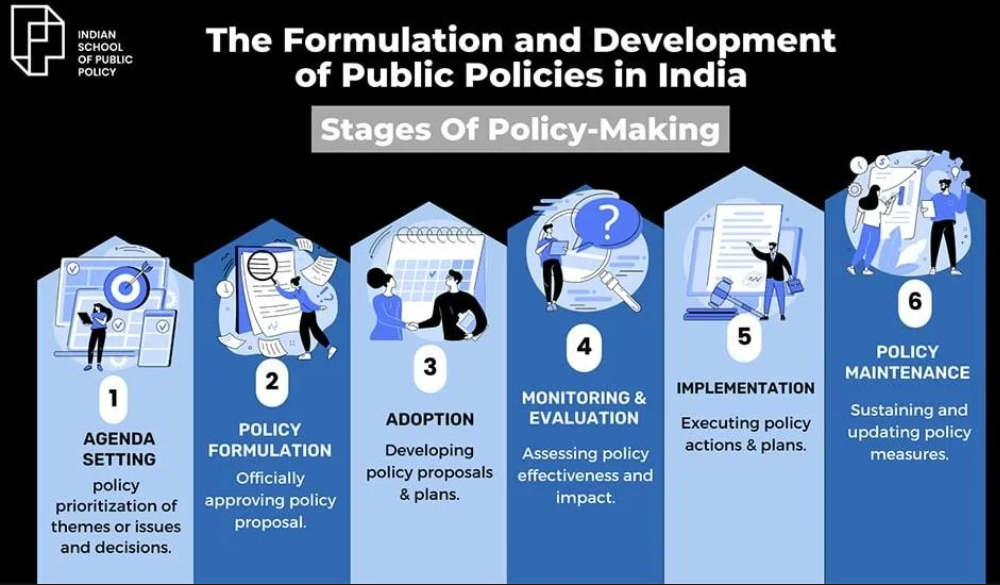India Needs World Class Policy Schools
Syllabus:
GS 2: Government Interventions
Why in the News?
Recently, debates and discussions about India’s need for a globally recognized public policy body have resurfaced, highlighting the gap in domestic policy studies and its limited impact on governance when it is compared with global peers around the world.
Introduction
- India, the world’s largest democracy, faces complex development challenges that require innovative public policy solutions.
- While there are many schools of planning, India lacks a world-renowned institution that shapes national and international governance.
- This gap stems from the country’s unique political context, were executive authority limits opportunities for effective policy discourse and education.
Why World Class Policy Institutions Lacking in India?
- While India is the world’s largest democracy and but yet to have a world-renowned institution of public policy like the Harvard Kennedy School or the London School of Economics.
- Policy schools do exist, but have limited influence on India’s political system.
- Decision-making is internal to the cabinet, marginalizing parliamentary debate and limiting scholarly and public access.
- Policy schools are unable to address India’s unique challenges, including informal power, caste system and realities on the ground.
- In addition, political instability reduces institutional stability.
- To gain global recognition, India needs to develop Policy schools based on its local realities with a focus on empathy, collaboration and inclusion.
Executive and Policy development in India
Limited Policy institutions Influence
- Public policy organizations prosper when they can influence decision-making processes.
- In India, policymaking has been limited by policy experts, academics and civil society groups.
- This is because most of the decision-making power resides in the executive and is exercised by political leaders, government officials, and executives.
- Parliamentary oversight is relatively low, resulting in an unusual ecosystem compared to other large democracies.
United States and decentralization in Policy making
- In the United States, Congress has the power to make laws independently of the executive branch.
- This creates opportunities for public policy schools, think tanks, and advocacy groups to make meaningful contributions to legislation.
- The decentralized process enables experts to access more areas, fostering a stronger ecosystem based on research, debate and knowledge.
Centralized power system in India
- In India, power of executive is highly concentrated and even in political parties, were leadership controls decision-making.
- Outside this inner circle, people struggle to make an impact unless they align with top leadership or priorities.
- In addition, the lack of planning in the India creates a distance between politics and policy, relegating policy issues to a secondary role.
Power and Policy Dynamics in India
- Unlike in other democracies, policy officials in India have little influence over decision-making, limiting their ability to deliver meaningful change.
- Influence of policy making in India has a lot to do with the dominance of the individual or political party in power.
- Unlike institutional democracies, the public sector in India changes dramatically as power changes hands.
- This weakness tends to marginalize decision-making participants when a new administration takes over.
- In contrast, more stable democracies ensure that think tanks, civil society groups and the media maintain their influence regardless of political change
Importance of adopting an Indian approach to Policy education
- These unique challenges require India to adopt a different paradigm of public policy education.
- Public policy institutions must account for the informal, private, and bureaucratic powers they manage at the national level.
How ideal organization would be:
- Provide students with traditional programming skills.
- Teach students to navigate the complexities of Indian political power, including informal networks, caste hierarchies, regional elites and grassroots movements.
- Unlike Western schools of Policy making, which focus on formal institutions, Indian institutions offer a curriculum tailored to socio-economic realities.
They should focus on understanding:
- How power works in opaque systems.
- How to adapt idealism to practical solutions in equitably distributed power systems.
- The role of socio-politics and regional dynamics in policy making.
Empathy is a fundamental value
- To create effective leaders, Indian schools of public policy must prioritize empathy.
- Understanding people’s lived experiences can prevent top-down decisions that can harm communities.
- Having sympathetic leadership is essential to enact policies that truly address India’s development challenges.
- In India, political legitimacy and influence are largely tied to government officials.
- This dependence fosters rhetoric, opportunism and instability in governance.
- Public interventions tend to be based more on proximity of power than on deep and positive intentions, limiting policy innovation.
Creating a comprehensive organizational space
- School of Public Policy should be an impartial place that prioritizes:
- deep and positive public
- Legitimacy is based on meaningful contributions rather than political rallies.
- Establishing this foundation requires structural changes in politics and governance.
- The school can start by forming partnerships like:
- Politics and bureaucracy
- Civil society
- Media and Broadcasting
Ensure consistency and relevance
- By fostering cooperation across sectors and political hierarchies, the organization can create a strong policy negotiation.
- Such graduates would remain relevant and influential regardless of regime change.
- This relief will improve governance and public debate in India.
A model for developing countries
- By addressing local realities rather than copying western models, such an organization would serve as a global model for other developing countries.
Conclusion
Public policy education must be in harmony with unique sociopolitical realities of India, emphasizing empathy, accommodation and policy rationality to nurture leadership, capable of promoting inclusive, robust and effective governance in India.
Source:The Hindu
Mains Practice Question:
Examine the challenges faced by public policy organizations in influencing decision-making in India. How does concentrating power in the bureaucracy limit the role of policy schools, think tanks and citizens in governance?





